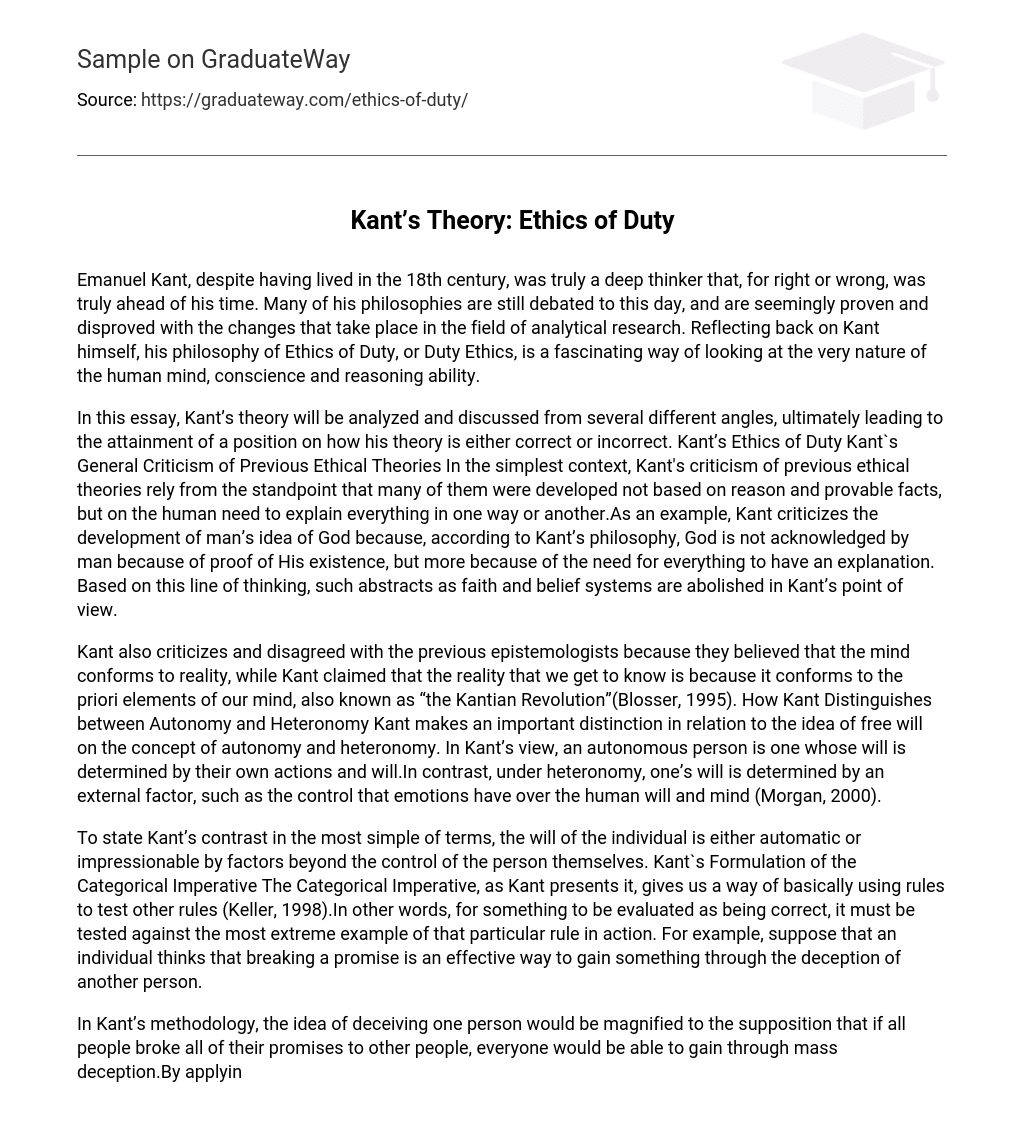Emanuel Kant, despite having lived in the 18th century, was truly a deep thinker that, for right or wrong, was truly ahead of his time. Many of his philosophies are still debated to this day, and are seemingly proven and disproved with the changes that take place in the field of analytical research. Reflecting back on Kant himself, his philosophy of Ethics of Duty, or Duty Ethics, is a fascinating way of looking at the very nature of the human mind, conscience and reasoning ability.
In this essay, Kant’s theory will be analyzed and discussed from several different angles, ultimately leading to the attainment of a position on how his theory is either correct or incorrect. Kant’s Ethics of Duty Kant`s General Criticism of Previous Ethical Theories In the simplest context, Kant’s criticism of previous ethical theories rely from the standpoint that many of them were developed not based on reason and provable facts, but on the human need to explain everything in one way or another.As an example, Kant criticizes the development of man’s idea of God because, according to Kant’s philosophy, God is not acknowledged by man because of proof of His existence, but more because of the need for everything to have an explanation. Based on this line of thinking, such abstracts as faith and belief systems are abolished in Kant’s point of view.
Kant also criticizes and disagreed with the previous epistemologists because they believed that the mind conforms to reality, while Kant claimed that the reality that we get to know is because it conforms to the priori elements of our mind, also known as “the Kantian Revolution”(Blosser, 1995). How Kant Distinguishes between Autonomy and Heteronomy Kant makes an important distinction in relation to the idea of free will on the concept of autonomy and heteronomy. In Kant’s view, an autonomous person is one whose will is determined by their own actions and will.In contrast, under heteronomy, one’s will is determined by an external factor, such as the control that emotions have over the human will and mind (Morgan, 2000).
To state Kant’s contrast in the most simple of terms, the will of the individual is either automatic or impressionable by factors beyond the control of the person themselves. Kant`s Formulation of the Categorical Imperative The Categorical Imperative, as Kant presents it, gives us a way of basically using rules to test other rules (Keller, 1998).In other words, for something to be evaluated as being correct, it must be tested against the most extreme example of that particular rule in action. For example, suppose that an individual thinks that breaking a promise is an effective way to gain something through the deception of another person.
In Kant’s methodology, the idea of deceiving one person would be magnified to the supposition that if all people broke all of their promises to other people, everyone would be able to gain through mass deception.By applying this principle, the conclusion is reached that the use of this particular rule is illogical, because promises would quickly become non-existent if all promises were broken outright. It is simply magnifying a rule to the highest degree places it under the closest scrutiny, allowing the rule to be tested under extreme conditions. Having explained the Categorical Imperative, the question arises as to what the value of the Imperative is to the ethical, thinking individual.
Adhering to the Categorical Imperative provides for autonomous ethical choice, because by applying the same rigid standards to all rules, the rules that lead human beings to making the correct ethical choices will stand up to scrutiny and those that result in incorrect ethical choices will essentially be discarded. As an example of this, an ethical rule such as not littering passes Kant’s test, because if everyone ceased littering, only good could come of it, with no downside and only benefits to the overall good of society.A Position on How Kant`s Theory on Ethical Decision Making is Correct Kant’s theory on ethical decision making is plausible, if for no other reason, taken from the viewpoint of his Categorical Imperative, which essentially allows for the evaluation of something by taking it to its most extreme and measuring its ability to survive under such extremes. Kant’s ethical theory is initially based on duty, so these duty based principles should be followed accordingly without question (Keller, 1998).
As Kant implies, if an individual is to conform to morality, that individual should not give regard to personal interest or to what Kant dubs as the end (Keller, 1998). Therefore, when individuals consider whether or not the choices they make are ethical, they have a means of doing so through the application of Kant’s theory. With such a mechanism in place, one has a built in moral compass of sorts; therefore, morality exists under Kant.In spite of Kant’s augmentation of the moral life through the separation of virtue from ethics (Berkowitz, 1999), it is safe to conform because it will require self assertion.
This assertion then is to be considered moral since it is grounded from a moral concept which is duty. In addition Kant’s definition in morality concerns a set of universal and necessary rules that go hand in hand with situations (Berkowitz, 1999). In this regard Kant’s ethical theory complies with the reality of the world because the definition is within the standards of right and wrong.Conclusion Like many philosophers who came before him as well as after him, Emanuel Kant tried to explain the nature of the human will, the ways that humans attempt to explain the world around them, and the consideration of right and wrong.
Most importantly, in conclusion, it appears that Kant forces people to take a closer look at them, as evidenced by discussions of Kant and his work, such as this essay, centuries after he left this world.





